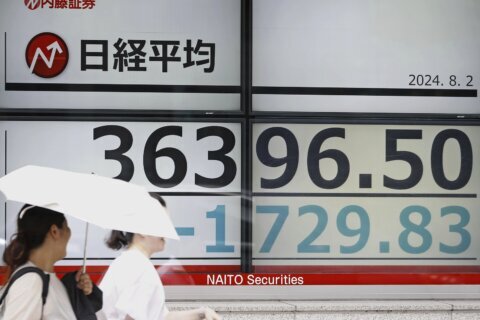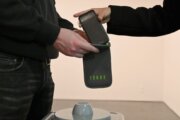CARACAS, Venezuela (AP) — The statement that upended Venezuela came 24 hours after polls closed in the presidential election.
With the reassuring tone of someone who has consistently been considered an underdog, opposition powerhouse Maria Corina Machado announced that her coalition had gathered more than two-thirds of vote tally sheets from polling centers nationwide, and that they show President Nicolás Maduro had lost his reelection bid.
The tally sheets known as actas — printouts measuring several feet that resemble shopping receipts — have long been considered the ultimate proof of election results in Venezuela. Opposition members knew they had to obtain as many of them as possible to refute the unfavorable election outcome they expected electoral authorities to announce.
Months of preparations and thousands of volunteers participated in the herculean task.
Their effort earned Maduro and his loyal National Electoral Council global condemnation, including from close regional allies, and fueled the anger of Venezuelans fed up with their nation’s cascading economy. In response, the government called for opposition leaders to be arrested, capping an election season marked by repression and irregularities.
This account of the opposition’s effort is based on public statements, as well as interviews with party representatives, volunteers and others involved, all of whom spoke on condition of anonymity for fear of government retribution.
Discipline
Tens of thousands of volunteers participated in training workshops nationwide in recent months. They learned that under the law they could be inside polling centers on Election Day, stationed near voting machines, from before polls opened until the results had been electronically transmitted to the National Electoral Council in the capital, Caracas.
Organizational discipline was key to their success because the ruling party wields tight control over the voting system. Polling places are guarded by soldiers, civilian militia, police and loyalists of the ruling United Socialist Party of Venezuela.
On Sunday, officials attempted to block opposition volunteers from voting centers, and in some places, they succeeded. But elsewhere, the volunteers were unshakable, and once inside voting centers, they did not leave, in some cases until after 11 p.m.
“They took courage with their law in hand, with the polling station manual in hand, and they managed to enter,” Machado said Sunday, before the polls closed. She called party representatives and other volunteers “the heroes of this process.”
The 90,000 party representatives were taught to obtain a copy of the tally sheets — printed from electronic voting machines after polls close — before the results were transmitted to the council.
“Our representatives have the right to their tally sheet,” Machado said. “No representative leaves their voting center without the document in hand.”
The volunteers were also trained to use a custom-made app to report voting center irregularities such as opening delays or power outages, and to scan a QR code printed on every tally sheet.
The “chorizo”
Venezuelans have used electronic voting machines for about two decades. The machines record votes, provide a paper receipt for each voter and — after polls close — print copies of the tally sheets, whose length has led to the nickname, “chorizo,” or “sausage’ in Spanish.
The tallies show vote totals broken down by candidate, the QR code and the signatures of party representatives, an employee of the electoral body and poll workers who are drawn by lot to participate.
Every party representative is entitled to a tally sheet, while another copy is placed in an envelope and delivered to the National Electoral Council headquarters.
Infighting and disorganization had consistently limited the ability of government opponents to secure and safeguard the tallies in previous elections. But Machado said the opposition had obtained more than 70% of sheets. That number would eventually grow to over 80%.
The QR code scans gave a team of campaign workers immediate access to voting results, which they tabulated Sunday night and Monday.
The National Electoral Council has not yet shared the tallies on its website, which has been down since Monday. While it is not obligated to post images of the tally sheets, it has previously shared each sheet’s totals.
The council on Monday reported that Maduro received 5.1 million votes, while Edmundo González, representing the Unitary Platform opposition coalition, earned more than 4.4 million. Council President Elvis Amoroso on Friday provided updated results from 96.87% of tally sheets, gave Maduro 6.4 million votes and Gonzalez 5.3 million.
Eight other men vied for the presidency, including Enrique Márquez, a former member of the electoral council, who decried the official results and lambasted authorities for the lack of transparency.
“Most of our witnesses … were prevented from accessing the voting centers,” he told reporters. “Those who were able to enter witnessed the process and waited for the tally sheets, but they were not given to them as required by law and its regulations. Not only does it violate the law, it generates obscurity, opacity, lack of transparency.”
The opposition, electoral experts and foreign governments questioning the official results, including President Luiz Inácio Lula da Silva of Brazil and President Gustavo Petro of Colombia, both Maduro allies, who have urged him to make the sheets public.
By bike, motorcycle, car or boat
Securing the “chorizo” from each of the 30,000 voting machines was only half the battle. The campaign needed to get them all fully scanned using equipment especially designed to copy the tally sheets.
That’s when yet more volunteers came into play. If the party representatives did not feel safe or were unable to reach the places where the scanners were housed, volunteers met the representatives, grabbed the sheets and transported them via motorcycle, car, bike and even boat to the appropriate locations.
By the time National Electoral Council President Elvis Amoroso was shown on television handing Maduro a document certifying his victory, the opposition had scanned more than half of the tally sheets. Hours later, Machado and González stood before reporters and announced the numbers that shook the country: The vote tallies show González received roughly 6.2 million votes versus Maduro’s 2.7 million. The scanned tallies were also uploaded to a searchable website, and anyone who voted could use their government identification number to check out the tally sheet belonging to the machine they used to vote.
The government then claimed that the electoral council’s website had been hacked. National Assembly President Jorge Rodriguez insisted Maduro was the indisputable winner and called his opponents violent fascists. He called for Machado and González to be arrested.
Maduro has faced a cascade of criticism ever since. International observers say they were unable to verify the results. Regional allies urged the government to publish the complete vote tallies. On Thursday, the U.S. government congratulated González on his victory.
“At least 12 million Venezuelans peacefully went to the polls and exercised one of the most powerful rights given to people in any democracy: the right to vote,” U.S. Secretary of State Antony Blinken said in a statement. “Unfortunately, the processing of those votes and the announcement of results by the Maduro-controlled National Electoral Council (CNE) were deeply flawed, yielding an announced outcome that does not represent the will of the Venezuelan people.”
Copyright © 2024 The Associated Press. All rights reserved. This material may not be published, broadcast, written or redistributed.







